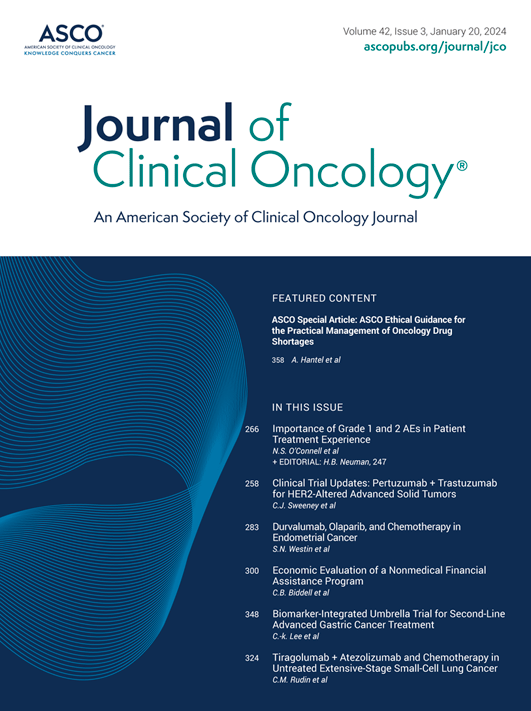新辅助化疗诱导的急性肾损伤对接受根治性膀胱切除术患者肿瘤学结果的影响:一项多中心回顾性研究。
IF 42.1
1区 医学
Q1 ONCOLOGY
引用次数: 1
摘要
573背景:新辅助化疗(NAC)诱导的急性肾损伤(AKI)是癌症(MIBC)患者的常见并发症。尽管先前的研究报告称,癌症治疗期间的AKI与几种癌症的肿瘤结果不佳有关,但NAC诱导的AKI对MIBC患者肿瘤结果的影响仍不清楚。方法:这项回顾性研究包括398名患者,他们接受了2-4个周期的NAC,然后进行了根治性膀胱切除术(RC)。AKI是根据KDIGO标准定义的。患者被分为两组:在NAC期间出现AKI的患者(AKI组)和没有出现AKI(非AKI组。对NAC诱导的AKI对无复发生存期(RFS)、癌症特异性生存期(CSS)和总生存期(OS)的影响进行了多变量Cox比例危险回归分析。结果:中位年龄和随访期分别为69岁和62个月。398名患者中,66人(17%)在NAC期间出现AKI。AKI组Impact of neoadjuvant chemotherapy–induced acute kidney injury on oncological outcomes in patients who underwent radical cystectomy: A multicenter retrospective study.
573 Background: Neoadjuvant chemotherapy (NAC)-induced acute kidney injury (AKI) is a frequent complication in patients with muscle-invasive bladder cancer (MIBC). Although previous studies have reported that AKI during cancer treatment was associated with poor oncological outcomes in several cancers, the impact of NAC-induced AKI on oncological outcomes in patients with MIBC remains unclear. Methods: This retrospective study included 398 patients who received 2-4 cycles of NAC followed by radical cystectomy (RC). AKI was defined according to the KDIGO criteria. Patients were divided into two groups: patients who developed AKI during NAC (AKI group) and patients who did not (non-AKI group). Multivariable Cox-proportional hazards regression analyses were performed to evaluate the impact of NAC-induced AKI on recurrence-free survival (RFS), cancer-specific survival (CSS), and overall survival (OS). Results: The median age and follow-up period were 69 years and 62 months, respectively. Of the 398 patients, 66 (17%) developed AKI during NAC. The rates of
求助全文
通过发布文献求助,成功后即可免费获取论文全文。
去求助
来源期刊

Journal of Clinical Oncology
医学-肿瘤学
CiteScore
41.20
自引率
2.20%
发文量
8215
审稿时长
2 months
期刊介绍:
The Journal of Clinical Oncology serves its readers as the single most credible, authoritative resource for disseminating significant clinical oncology research. In print and in electronic format, JCO strives to publish the highest quality articles dedicated to clinical research. Original Reports remain the focus of JCO, but this scientific communication is enhanced by appropriately selected Editorials, Commentaries, Reviews, and other work that relate to the care of patients with cancer.
 求助内容:
求助内容: 应助结果提醒方式:
应助结果提醒方式:


